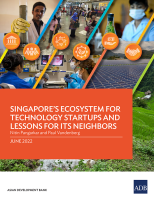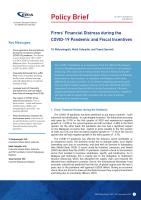From Poverty to Prosperity: The Power of Green Entrepreneurship in ASEAN

Head of Startups and Digital Inclusion, Economic Research Institute for ASEAN and East Asia (ERIA)

Inclusive Education Consultant, Economic Research Institute for ASEAN and East Asia (ERIA)

Businesses operating with sustainability at their core have immense potential to tackle poverty and drive sustainable development. Photo credit: iStock/Perawit Boonchu.
Green enterprises help fight poverty by creating jobs and adopting sustainable practices.
This article is published in collaboration with the Economic Research Institute for ASEAN and East Asia.
Poverty is a pressing issue that continues to impact millions of people across the ASEAN region. According to the Asian Development Bank (ADB), the COVID-19 pandemic led to an increase in the number of people living in extreme poverty in Southeast Asia. In 2021 alone, the region saw an additional 4.7 million individuals pushed into the most severe levels of poverty, effectively reversing the progress made in poverty reduction.
In addition, ASEAN stands out as one of the most susceptible to the impacts of climate change. Its vulnerability stems from a combination of factors, such as its unique geography, densely populated coastal regions and other at-risk areas with bustling economic activities, and the crucial reliance on agriculture and other livelihoods dependent on natural resources, particularly in rural communities. Furthermore, Southeast Asia encounters considerable risks associated with climate-induced disasters, including cyclones, severe floods, heat waves, and prolonged periods of drought.
Governments and public institutions alone cannot address these issues: the role of the business sector is key, and, specifically, it is imperative to recognize the immense potential of green entrepreneurship in tackling poverty and driving sustainable development across ASEAN. Green entrepreneurs are business owners who create and operate environmentally sustainable businesses and whose contribution combines social and economic development. By creating jobs and promoting sustainable practices, green entrepreneurship can have a significant impact on poverty reduction.
The role of innovation
Innovation plays a crucial role in this context. Emerging companies, particularly startups, have the potential to drive significant change. They represent the future, as they create new business models to address unresolved challenges.
The significance of innovation and startup creation in the sustainability and inclusion field is evident. Moreover, sustainability and inclusion may differ, but they are deeply interconnected concepts with multiple synergies: if some groups of individuals feel excluded because for them the green transformation is too costly, incomprehensible, or complicated, the transition toward sustainability will take longer or not happen at all.
In ASEAN, we can find inspiring examples of entrepreneurs successfully combining the green transition with inclusion. For instance, the Philippines-based social enterprise, Rags2Riches, empowers over 900 women in impoverished communities by training them to create sustainable fashion products using scrap materials. This enterprise effectively combines the promotion of environmental sustainability with the provision of sustainable livelihoods for disadvantaged women. The Jakarta-based company X Project develops products by recycling materials and working with the families of plastic pickers to provide better education opportunities to their children.
Targeted educational programs
To further promote green entrepreneurship and alleviate poverty, access to education and training is crucial. Green entrepreneurs require knowledge and skills in sustainable practices and technologies, which can be obtained through targeted educational programs. By improving access to education and fostering environmental consciousness, ASEAN can tackle the underlying causes of poverty and contribute to sustainable development. Governments and nongovernment organizations can play pivotal roles in providing these resources to communities in need.
The impact of poverty on health and food security within ASEAN is another pressing issue that can be addressed through green entrepreneurship. Impoverished communities often face limited access to healthcare and nutritious food, leading to malnutrition and preventable illnesses. By promoting sustainable agriculture and environmentally friendly practices, green entrepreneurship can contribute to food security and better health outcomes for these communities. Not surprisingly, several countries in ASEAN are investing in research and development (R&D) in this area, with the hope that commercially viable solutions will follow.
Policies and initiatives to support green entrepreneurs across ASEAN, from dedicated access to financing, education and training, enhanced investments in green R&D both in the business sector and in public research labs and universities, attraction, and retention of talent through green entrepreneurship visa schemes, all have the potential to find smart solutions to environmental problems while, at the same time, doing good for our societies.
This article has been published on the Manila Times, Voice of Vietnam, and Borneo Bulletin

Giulia Ajmone Marsan
Head of Startups and Digital Inclusion, Economic Research Institute for ASEAN and East Asia (ERIA)Giulia Ajmone Marsan is an innovation, technology, and entrepreneurship strategist, with over 15 years of experience in economic policy analysis and advice, capacity building, and economic diplomacy. She has advised a broad range of government officials, international organizations, and other stakeholders across Asia, Latin America, and Africa, as well as member countries of the Organisation for Economic Co-operation and Development. She co-chaired the Inclusion Task Force of Startup20 under G20 India and was a member of the ESG Task Force of Startup20 under G20 Brazil.

Rubeena Singh
Inclusive Education Consultant, Economic Research Institute for ASEAN and East Asia (ERIA)Rubeena Singh authored the ERIA report, Inclusive Education in ASEAN: Fostering Belonging for Students with Disabilities, which analyzes the inclusive education landscape in ASEAN amid the pandemic and provides policy recommendations to improve inclusive education systems in the region. She is currently the manager for research and knowledge at research and strategic communications agency Kite Insights.


